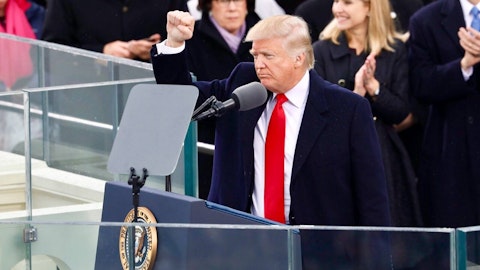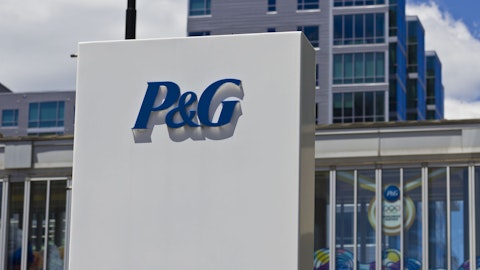And more than anything else, we are supportive. Obviously, there’s a desire to make things go faster. And frankly, that’s a function of the opportunity set. And if you think about the IRA and the role it plays, that legislation hasn’t even been translated into regulations yet and that’s going to be a critical step. And I think there are many governments around the world who are working on appropriate legislation to incentivize and create a carbon — market for carbon that hasn’t come to be yet. So there, we’re very early in this process and there are a number of players in here who have a role deliver. We feel like we’re delivering on our part, but there are other elements that have to come together for this to be successful. And then ultimately, we’re going to need advances in technology to keep driving that cost down so that we can get to more and more diluted streams of CO2.
And we’re doing a lot of work in that space. And frankly, again, I think our pipeline of opportunities, our technology pipeline, I feel pretty good about it. And I hope to, in the next several years to hopefully commercialize some technologies to further reduce the cost of emissions reductions. So I think early, a lot of work going on. I think we’re making a lot of good progress and we feel good about the role that we’re playing in the leadership position that we have.
Roger Read: Great. Thank you.
Operator: We’ll go next to Sam Margolin with Wolfe Research.
Sam Margolin: Hello. Is that is that better, sound wise?
Darren Woods: That is better. That’s better, Sam. Welcome back.
Sam Margolin: I’m okay. So this question is about EOR as it pertains to Denbury. I think, there’s some optimism that EOR barrels might be credited with carbon attributes because it varies more CO2 than the associated emissions of the oil. And so, maybe that’s option value, but I was just wondering where you stand on that topic and if it was at all a factor as you look at different asset classes and saw that EOR was available?
Darren Woods: Yes. So I would say, obviously, that’s the core business today of Denbury and had facilitated infrastructure that they have in place. That frankly for us was not a key driver, strategic driver of the opportunity. I think EOR certainly in the short term can play a role. But if you think about the broader opportunity, it’s really around carbon capture storage, sequestration and keeping the carbon under the ground. So that’s the longer term play for us. I mean, as I just commented here about the challenges with the regulation and the translation of the IRA into regulation, we’ve got Class 6 well Permian, that’s going to be required for sequestration. That’s a fairly slow progress to date. So, there’s a lot of work that has to go into putting these pieces together so that we’re successful.
I see EOR as providing a lot of optionality in the short term that as we’re bringing on carbon capture facilities, working with third parties and we start capturing the CO2. If we don’t have everything lined up on the sequestration side, the EOR gives us an opportunity to progress these things and not lose schedules. So, I think right now that’s the way I would think about it. It’s certainly not a strategic thrust for us as a company.
Sam Margolin: Understood. Thank you so much.
Darren Woods: You bet. Thank you.
Operator: We’ll go next to Stephen Richardson with Evercore ISI.
Stephen Richardson: Good morning. I was wondering if we could dig in a little bit on the debottlenecking opportunity you talked about in Guyana, clearly 20% above nameplate is or above design is pretty significant. Darren, could you drill in a little bit on what you’re seeing here? Is it changes to — in the subsurface? Is it changes in the kit? Is it uptime? Kind of scale that for us And maybe just, I mean, there’s really significant benefits if you roll it forward on a couple of the other projects that you have in the queue. So maybe just talk about how it’s changing your view of the future opportunities? Thank you.





